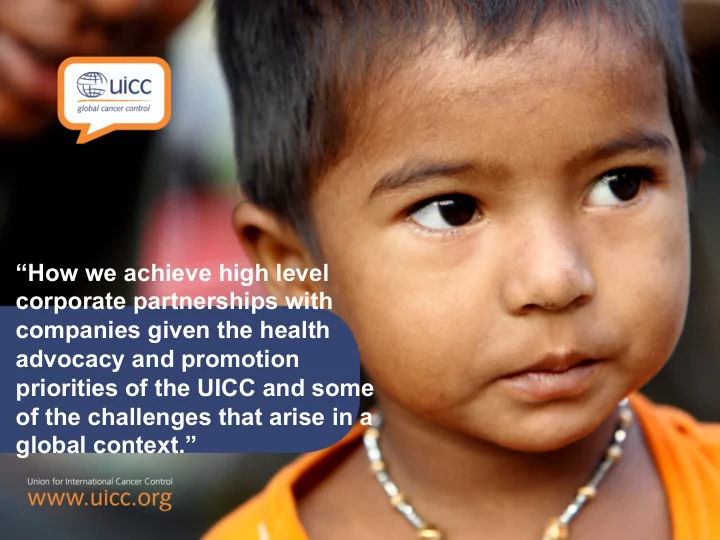

“How we achieve high level corporate partnerships with companies given the health advocacy and promotion priorities of the UICC and some of the challenges that arise in a global context.”
World Cancer Declaration
3 Key Questions • Can we deliver the World Cancer Declaration targets without engaging the private sector? • Which corporate players should we work with and partner? • Conflict of interest in Global Advocacy?
Essential to our future
Not essential to our future
Corporate impact Nearly 70% of the working population is employed by the private sector
Key Questions • Can we deliver the World Cancer Declaration targets without engaging the private sector? • Which corporate players should we work with and partner? • Conflict of interest in Global Advocacy?
An extreme view • An NGO should not associate itself in any way with a private sector company because there is an inherent conflict of interest. • Taking restricted or unrestricted funding is irrelevant • An NGO which takes private sector funding is a “BINGO” (Business Interest NGO) and their view will be affected by the relationship • An NGO which does not is a “PINGO” (Public Interest NGO)
Ranges of possibilities • Within the UICC membership we have a wide range of NGOs which do or do not have relationships with the private sector • Some have relationships with sub-brands of large corporate entities, but not the main corporate. • Some have local or regional relationships but not global relationships. • Restricted and unrestricted
UICC enjoys positive partnerships with many organisations UN AGENCIES Ecosoc status with the United Nations Formal Relations with WHO Partner with IAEA and IARC
UICC enjoys positive partnerships with many organisations
It’s not simply black and white Avoid ¡ Talk ¡ Partner ¡
Partner Assessment Framework Conflict High Low Direct Impact on Cancer and NCDs Cause Solve Complementary Skills/Expertise/Assets Weak Strong CSR/Foundation Activity Nil Active Workforce Wellness Approach Negative Effective Advocacy Activity Hinders Helps Scale of Impact Local Global Appetite for Change Negative Positive Avoid ¡ Talk ¡ Partner ¡
Example 1: tobacco company Conflict High Low Direct Impact on Cancer and NCDs Cause Solve Complementary Skills/Expertise/Assets Weak Strong CSR/Foundation Activity Nil Active Workforce Wellness Approach Negative Effective Advocacy Activity Hinders Helps Scale of Impact Local Global Appetite for Change Negative Positive Avoid ¡ Talk ¡ Partner ¡
Example 3: food and beverage Conflict High Low Direct Impact on Cancer and NCDs Cause Solve Complementary Skills/Expertise/Assets Weak Strong CSR/Foundation Activity Nil Active Workforce Wellness Approach Negative Effective Advocacy Activity Hinders Helps Scale of Impact Local Global Appetite for Change Negative Positive Avoid ¡ Talk ¡ Partner ¡
3 Key Questions • Can we solve the global cancer and NCD challenge without engaging the private sector? • Which corporate players should we work with and partner? • Conflict of interest in Global Advocacy?
Global advocacy involves everyone. • Everyone is involved in global advocacy for health – UN, WHO, governments, private sector, academia, civil society, individuals, you. • Alliances both formal and informal form on a regular basis linked to a theme, an issue or in opposition to another view • Players can adopt several positions on the same issue (or change position quickly for no apparent reason) • Strange alliances emerge and unexpected positions can be adopted – sometimes linked to completely unrelated issues • There are few “pure” right/correct views, and compromise (consensus) dominates thinking as a “good result” • Trading takes place • The words used are incredibly important • Many players are skilled diplomats and politicians – not enthusiastic amateurs • There are many tourists and side shows
It’s not simply black and white – advocay response Avoid/ ¡ Talk/ ¡ ¡ Partner/ counter ¡ coerce ¡ plan ¡
Key things for success • Know what you want – Proposed Outcomes Document from the NCD Alliance • Support your demands with evidence • Have a plan and the resource to execute the plan • Understand who can influence the outcome you want (in the UN system, member states, individuals, other organisations) • Get to them professionally and effectively • Choose your partners/allies wisely, issue by issue • Counter the opposition • Stay the course
Impact on partnerships • You don’t have to agree on everything • Transparency in the relationship is critical • A firewall on policy issues is critical • Use independent scientific evidence to substantiate all positions you adopt • What’s the economic argument for action? – Head, heart and pocket
Measuring success • A UN High Level Meeting on NCDs • An increased understanding and awareness of NCDs around the world – no longer the forgotten diseases • A global goal to reduce premature deaths throgh NCDs by 25% by 2025 • A commitment to agree 10 targets and many indicators to measure progress, by the end of 2012 • NCDs in the replacement MDGs in 2015
Recommend
More recommend